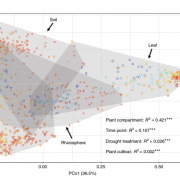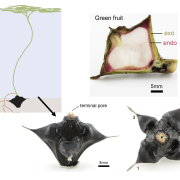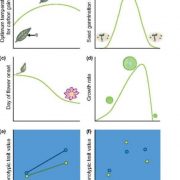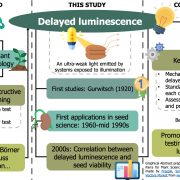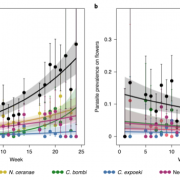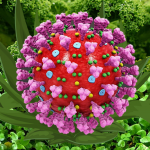Ecological strategies begin at germination: Traits, plasticity, and survival in the first four days of plant life ($) (Funct. Ecol.)
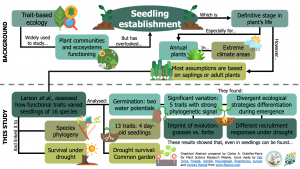 Seedling establishment is seldom addressed in trait-based ecology. Advocating for the importance of this stage of a plants’ life, Larson et al. assessed how functional traits varied in newly emerged seedlings and how this was related to their phylogeny and survival under drought. The authors germinated seeds of sixteen species of grasses and forbs under two water potential conditions. After three seeds of each replicate germinated, three individuals were randomly selected and grown for four additional days. The authors measured traits related to seeds, seedling growth, resource allocation, and tissue construction and recorded seedlings survival under drought by transplanting seedlings into pots watered only at the beginning of the experiment. The authors found significant trait variation among species, and a strong tendency of related species to share similar attributes in five of them (mostly regarding root investment). They show this variation was associated to both species plastic responses (i.e., attribute variation in response to drought within a species) and to different ecological strategies (e.g., slow vs. fast growing), which had a different effect on their survival in drought conditions. (Summary by Carlos A. Ordóñez-Parra) Funct. Ecol. 10.1111/1365-2435.13543
Seedling establishment is seldom addressed in trait-based ecology. Advocating for the importance of this stage of a plants’ life, Larson et al. assessed how functional traits varied in newly emerged seedlings and how this was related to their phylogeny and survival under drought. The authors germinated seeds of sixteen species of grasses and forbs under two water potential conditions. After three seeds of each replicate germinated, three individuals were randomly selected and grown for four additional days. The authors measured traits related to seeds, seedling growth, resource allocation, and tissue construction and recorded seedlings survival under drought by transplanting seedlings into pots watered only at the beginning of the experiment. The authors found significant trait variation among species, and a strong tendency of related species to share similar attributes in five of them (mostly regarding root investment). They show this variation was associated to both species plastic responses (i.e., attribute variation in response to drought within a species) and to different ecological strategies (e.g., slow vs. fast growing), which had a different effect on their survival in drought conditions. (Summary by Carlos A. Ordóñez-Parra) Funct. Ecol. 10.1111/1365-2435.13543
[altmetric doi=”10.1111/1365-2435.13543″ details=”right” float=”right”]


